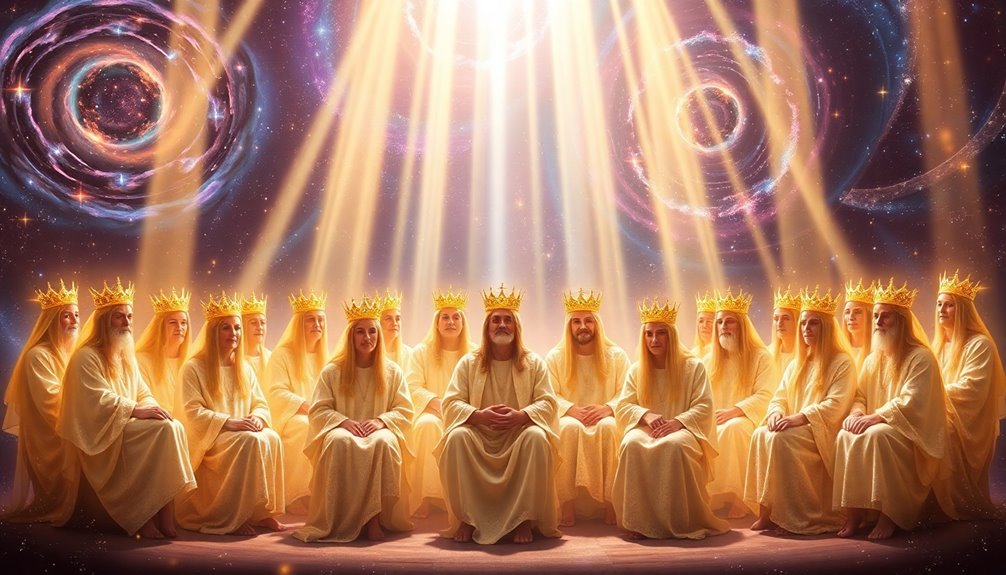God created man to reflect His image and foster a loving relationship that glorifies Him. You're unique in this creation because you're designed for connection, not just existence. This bond allows you to understand and experience God's love deeply. Your life has purpose, and through acts of kindness and worship, you can fulfill this divine plan. Unlike ancient beliefs that saw creation as a necessity for the divine, God's independence shows how special you are in His eyes. For a deeper understanding of this magnificent purpose, exploring further can reveal even more about your role in creation.
Key Takeaways
- God created man out of love, desiring a relationship rather than out of necessity (Revelation 4:11).
- Humanity is made in God's image, highlighting their unique significance and purpose (Genesis 1:26-27).
- The purpose of creation is to bring glory to God and establish meaningful connections with Him (Isaiah 43:7).
- Serving others and fostering community reflect God's love and fulfill His purpose for humanity (Ephesians 4:16).
- Human suffering entered the world through sin, leading to spiritual growth and reliance on God's love (Romans 8:28).
Introduction

When you consider why God created humanity, it's essential to recognize that this act was rooted in His desire for relationship rather than necessity. God, in His infinite wisdom, chose to create you for His pleasure and glory. Revelation 4:11 reveals that creation reflects God's nature as a loving and creative Being, emphasizing that your existence isn't a mere afterthought but a purposeful act of love.
Made in God's image, as stated in Genesis 1:27, you share a unique bond with your Creator. This individuality underscores the importance of genuine relationships, emphasizing that God doesn't need you for companionship; He invites you into a loving connection.
Despite His independence, highlighted in Psalm 50:12-13 and Acts 17:25, God desires authentic interactions with you. The concept of covenant further illustrates His motivations. By creating humanity, God aims to share His goodness and love, inviting you to participate in His divine joy.
This foundation of love and choice is what makes your relationship with God so profound and meaningful, illustrating His grace as He longs for an enduring connection with you.
Biblical Basis for Creation

To understand the biblical basis for creation, you'll want to start with key scriptures that highlight humanity's purpose.
Genesis 1:26-27 and Revelation 4:11 clearly show that you were created in God's image and for His pleasure.
Primary Bible References
At the heart of understanding why God created man lies a rich tapestry of biblical references that illuminate His purpose. In Genesis 1:26-27, you see that God created us in His image, setting humanity apart from all other creations. This unique status fosters a special relationship between you and your Creator, allowing you to reflect His character in ways that other beings cannot.
Revelation 4:11 emphasizes that all things were made for God's pleasure, reinforcing that your existence is meant to glorify Him. Colossians 1:16 further affirms that everything was created by God and for Him, showcasing His greatness and beauty through your life.
Ephesians 1:4-5 reveals that God's plan for redemption was laid out before creation, illustrating that your existence is intricately tied to His divine purpose.
Psalm 8:5 crowns you with glory and honor, highlighting your significant role in creation. As you embrace this truth, remember that you were designed to reflect the glory of God, revealing His attributes in a world that desperately needs His light.
Secondary Bible References
Exploring secondary Bible references reveals even more insights into why God created humanity. In Genesis 1:26-27, you see that God created us in His own image, establishing a unique relationship that sets humans apart from all other creations. This divine image highlights your inherent value and purpose.
Revelation 4:11 emphasizes that humanity was crafted for God's pleasure, underscoring that existence isn't just about survival but about bringing glory to the Creator.
Moreover, Colossians 1:16 reinforces that all things were created by God and for God, indicating that your life serves a divine purpose. Psalm 8:5 crowns you with glory and honor, showcasing the significant role you play within God's creation.
Lastly, Isaiah 43:6-7 reveals that God's creation of humanity is a display of His glory, illustrating how your very existence reflects His greatness and beauty.
Ancient Near Eastern Beliefs

Ancient Near Eastern beliefs about the creation of humanity reveal a stark contrast to the biblical narrative. In myths like those from Mesopotamia, gods often created humans not out of love but to fulfill their own needs, such as alleviating hunger or performing labor.
You'll find that in these stories, humans were seen as servants meant to provide offerings and sustenance for the gods, emphasizing a relationship based on necessity rather than affection.
Take the Enuma Elish, for instance. It describes how humanity was fashioned from the blood of a slain god, created to serve divine beings. This portrayal highlights a significant difference in the nature of God between these cultures and the biblical view.
Unlike the biblical account, where God didn't create humanity out of need, these myths illustrate a dependency of deities on human existence for survival and worship.
In contrast, the Judeo-Christian narrative underscores God's independence, showing that He created humans with intention and love.
This distinction highlights how ancient beliefs often centered on a transactional relationship, while the biblical story emphasizes a deeper, more meaningful connection.
Theological Perspectives on Creation

Understanding the theological perspectives on creation reveals a profound significance in the relationship between God and humanity. According to the biblical account, God created all things, including humanity, to reflect His image (Genesis 1:26-27). This act wasn't out of necessity, but from God's love and desire to share His glory with His creation, emphasizing His self-sufficiency (Revelation 4:11).
Unlike ancient myths that depict humans as mere laborers for divine sustenance, the Scripture presents you as a purposeful being designed to worship and glorify God. You exist to bring recognition to His faithfulness and goodness, even though God doesn't need your praise for His well-being (Acts 17:25; Psalm 50:12-13).
This relational dynamic highlights that God values your worship as a means for you to understand your own purpose. While He remains independent of creation, the love He extends invites you into a relationship where your existence has profound meaning.
Embracing this perspective fosters a deeper appreciation for the unique bond you share with your Creator, illuminating the purpose behind your very being.
Misunderstanding Divine Purpose

You might find that many misconceptions about why God created humanity stem from a misunderstanding of divine purpose.
Instead of seeing creation as a necessity, it's crucial to recognize it as an outpouring of God's love, inviting us into a meaningful relationship.
This perspective challenges the notion that human suffering contradicts God's goodness, pushing us to explore the true depth of our existence.
Debunking Creation Misconceptions
Misconceptions about why God created humanity often stem from ancient myths and misunderstandings of divine purpose. Many people mistakenly believe that God made humans to satisfy a divine hunger or need. However, scripture emphasizes God's independence and self-sufficiency, illustrating that He doesn't rely on us for sustenance (Psalm 50:12-13, Acts 17:25).
Others think God created humanity out of loneliness, but in truth, God is complete within the Trinity, and creation was an act of divine will, not necessity (Exodus 3:14).
Some may argue that human existence is vital for God's well-being, yet this notion contradicts the biblical assertion that God doesn't need us for survival (Psalm 50:10-11). Moreover, the idea that God requires our praise is misguided; His desire for a relationship with us stems from God's love, not a need for acknowledgment (Zephaniah 3:17).
Ultimately, humans were made to reflect God's glory and bring Him pleasure, highlighting our purpose in His grand design (Revelation 4:11). Understanding these truths can help clarify why God created humanity and dispel lingering misconceptions.
Human Suffering Contradicts God's Goodness
The existence of human suffering often raises profound questions about God's goodness and purpose. You might wonder how a loving God could allow pain and hardship. Many struggle with this contradiction, but it's essential to consider that suffering entered the world through human sin, emphasizing the role of free will. In Genesis 3, humanity chose rebellion, which set the stage for suffering.
However, shifting your perspective can illuminate the purpose behind suffering. It can lead to spiritual growth and a deeper reliance on God's love. Instead of viewing suffering merely as a contradiction, consider it part of a divine plan aimed at transformation and authentic relationship with Him.
The concept of a fallen world allows for both God's goodness and human suffering to coexist. Romans 8:28 reassures us that despite present pain, God's ultimate redemption plan through Christ provides hope and restoration. Recognizing that suffering can draw you closer to God underscores its purpose. Rather than robotic obedience, God desires genuine relationship and praise. Understanding this can help reconcile your questions about suffering and God's goodness, revealing a deeper, more meaningful divine purpose.
Additionally, embracing unconditional love during times of hardship can foster resilience and strengthen your connection with God and others.
Serving Others in Love

When you embrace daily acts of kindness, you reflect God's love in tangible ways.
These small gestures not only uplift others but also strengthen the community around you.
Embrace Daily Acts of Kindness
How can daily acts of kindness transform our lives and the world around us? Embracing kindness reflects God's love, allowing you to express that love through your interactions. Each small act, whether it's a compliment or helping someone in need, serves as a practical expression of God's nature.
By choosing kindness, you foster genuine relationships, aligning with God's desire for authentic connections rather than mere robotic obedience. Your free will empowers you to engage in these acts voluntarily, showcasing God's grace and mercy as emphasized in Romans 5:8.
When you practice kindness, you're not just fulfilling a duty; you're glorifying God (Isaiah 43:7) and living out your faith in tangible ways. These daily acts enhance a sense of community and belonging, reminding others of the love and forgiveness central to the Christian experience.
As you incorporate kindness into your routine, remember that every small gesture can ripple out, impacting lives beyond your own. So, embrace daily acts of kindness, and watch how they transform not only your life but also the lives of those around you.
Fostering Community Through Service
In today's fast-paced world, serving others in love creates profound opportunities to foster community and deepen relationships. When you choose to serve others, you reflect God's love and embody His nature, as He designed humanity to engage in genuine connections that mirror His grace (1 John 4:8).
Acts of service build trust and connection, emphasizing our collective responsibility to fulfill God's purpose for creation (Ephesians 4:16).
By actively participating in community service, you express your free will, opting for kindness and love over self-interest, which demonstrates authentic faith (Galatians 5:13). When you serve those in need, you not only meet practical requirements but also showcase God's mercy, inviting others to experience His love through your actions (Matthew 25:40).
Engaging in community service aligns with the biblical command to love your neighbor, cultivating an environment of support and encouragement. This reflects the unity of the body of Christ, reminding us that we're stronger together (Romans 12:10).
Ultimately, serving others in love not only enriches your life but also strengthens the fabric of your community, fostering lasting relationships rooted in God's love.
Divine Purpose in Human Creation

The divine purpose behind human creation centers on bringing glory to God and establishing a relationship with Him. As you reflect on this, remember that God created humanity for His pleasure and His glory, as Revelation 4:11 states.
You were made in God's image (Genesis 1:27), setting you apart from all other creatures. This unique status signifies the importance of your existence in God's divine purpose.
God loves us deeply, and His desire for a relationship with you reflects His nature. Zephaniah 3:17 illustrates how God rejoices over His creation, emphasizing His care and joy in knowing you personally.
Your purpose isn't just to exist but to actively bring glory to God, as highlighted in Isaiah 43:7.
Even though God is independent and self-sufficient, He values your praise and acknowledgment. This relational dynamic is vital for understanding the divine purpose behind your creation.
When you recognize and fulfill this purpose, you participate in a beautiful relationship with your Creator, aligning your life with the very reason you were made. Embrace this calling, and let it shape your journey.
Additional Resources

Exploring additional resources can deepen your understanding of why God created man and the significance of this relationship. John Piper's "Desiring God" emphasizes that humanity was created to glorify God, aligning your purpose with divine truth and joy. This book can help you grasp the idea that your existence reflects God's glory.
The Bible also provides insight, as seen in Revelation 4:11, which states that humans were created for God's pleasure. Recognizing this purpose can enrich your spiritual journey and relationship with Him. Theologians like J.I. Packer offer deeper insights into God's purpose for creation and the essential connection between God and humanity.
Karl Barth's perspective underscores the relational aspect of creation, highlighting the importance of experiencing God's love and goodness in your life.
Additionally, exploring ancient creation myths alongside biblical accounts can illuminate God's independence and desire for a relationship with you, as discussed in Psalm 50:12-13 and Acts 17:25. By engaging with these resources, you'll uncover the profound significance of your existence within God's grand design.
Frequently Asked Questions
What Are the Reasons Why God Created Man?
God created humanity for several reasons.
First, He wanted to express His love and goodness through you. You're made in His image, allowing for a unique relationship with Him.
Your purpose is to bring glory to God, reflecting His nature in your actions. He desires your praise and acknowledgment, emphasizing the importance of connection.
Ultimately, you exist to fulfill His divine plan, showcasing the beauty of His creation and the depth of His love.
What Is the Reason for God Becoming Man?
God became man to reveal His love and grace in a tangible way.
By experiencing human life, He empathized with your struggles and temptations, showing you that He understands your pain. His teachings and actions illustrate the nature of God, emphasizing holiness and mercy.
Ultimately, His sacrificial death was vital for your redemption, highlighting the depth of His love for you. This act invites you into a personal relationship with Him.
What Is the Purpose of a Man in the Bible?
In the Bible, your purpose as a man is to reflect God's glory and engage in a loving relationship with Him.
You're called to worship, serve, and experience His unconditional love, which isn't just for your benefit but also for sharing with others.
Through living out these principles, you fulfill your role in God's divine plan, emphasizing grace and love, while bringing honor to your Creator and experiencing true fulfillment.
Why Did God Create What He Created?
God created everything to express His glory and goodness.
When you look at creation, you see His power and artistry in every detail. Each element serves a purpose, reflecting His love and desire for relationship.
It's not about need; it's about sharing His abundant life with you. By appreciating the beauty around you, you honor the Creator and understand your place within this divine tapestry, built for love and worship.










